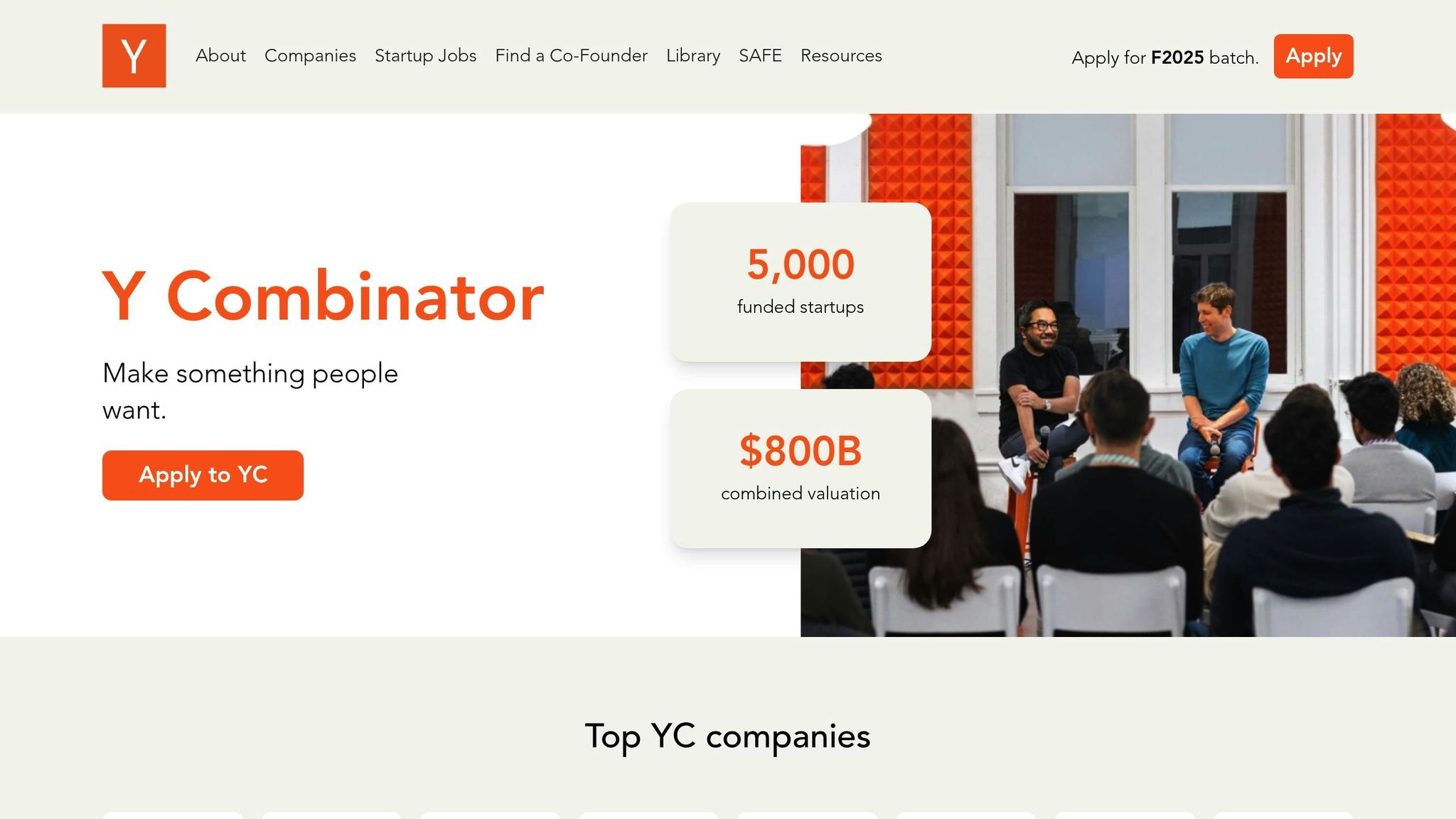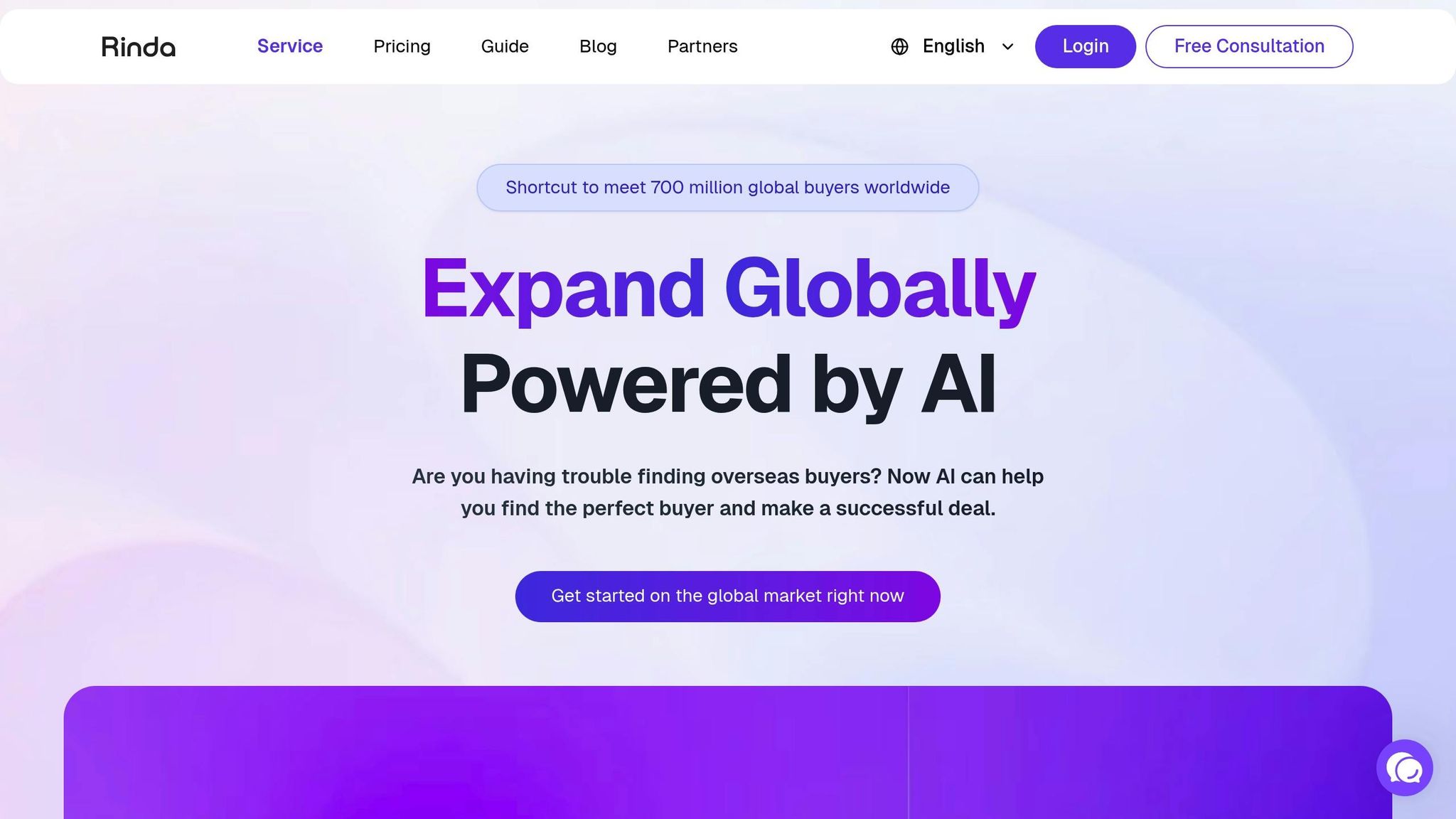The Startup Sales Playbook 2025: Y Combinator-Backed AI Agents Replace Traditional SDRs
AI agents are revolutionizing sales by automating key tasks traditionally handled by SDRs, enabling businesses to thrive in a competitive market.

The sales world is shifting fast. By 2025, 75% of buyers prefer sales experiences without human reps, reshaping how businesses approach growth. This trend is fueled by AI-powered tools that now handle key sales tasks like lead qualification, outreach, and deal closures - functions traditionally managed by Sales Development Representatives (SDRs). Startups backed by Y Combinator are at the forefront, leveraging AI to build leaner, more scalable sales teams.
In this article, you'll discover:
- How AI agents outperform SDRs: Learn how they handle lead qualification, personalized outreach, and follow-ups with unmatched precision.
- Key advantages of AI-driven platforms like RINDA: Explore features such as multilingual communication and real-time buyer analysis, enabling global expansion.
- The evolving role of sales teams: Understand how human professionals are focusing on high-value tasks like relationship management and complex negotiations.
This shift isn’t just about efficiency - it’s about staying competitive in a market prioritizing automation. With AI platforms like RINDA offering tiered pricing and global capabilities, businesses of all sizes can now access tools once reserved for larger organizations. Read on to see how AI is reshaping sales and how your business can thrive in this new landscape.
This AI Sales Automation 5x’d My Close Rate (Full Tutorial)
Y Combinator's Focus on AI Sales Automation

Y Combinator has turned its attention to AI-driven sales solutions that reimagine the sales process from the ground up, rather than just enhancing existing tools. A critical factor in their investment strategy is the ability of startups to scale effectively with lean, high-performing teams.
This strategic direction is evident in their 2025 portfolio.
2025 AI Sales Startups
The 2025 portfolio highlights a variety of AI-first sales startups that align with this forward-thinking approach. These companies are leveraging AI to transform conventional sales workflows, aligning with Y Combinator's vision of fostering fast and efficient growth.
Creating AI-Driven Sales Tools
Y Combinator also supports the creation of AI-native tools that do more than just digitize current processes. They encourage startups to tap into AI's potential to revolutionize sales operations, reshaping workflows to improve efficiency. These advancements are accelerating the transition from traditional practices to intelligent sales automation.
How AI Agents Handle Sales Development Tasks
AI agents are reshaping the way sales development representatives (SDRs) tackle their daily responsibilities. Unlike traditional automation tools that simply digitize existing workflows, these systems reimagine sales processes by enabling autonomous and highly personalized outreach. From identifying prospects to closing deals, AI agents leverage their ability to process massive datasets to streamline the entire sales development cycle. Let’s explore how these systems excel in key areas of sales development.
Finding and Qualifying Leads
AI agents are redefining how leads are identified and qualified. By analyzing vast amounts of data - something human SDRs could never do at the same speed or scale - these systems uncover high-potential prospects with remarkable precision. They evaluate indicators such as growth trends, technology adoption, hiring activity, and behavioral patterns to pinpoint leads that are most likely to convert.
Using machine learning, AI agents continuously refine their lead scoring models. They assess historical conversion rates, engagement behaviors, and firmographic details to predict buying intent more accurately. Additionally, they pull information from multiple sources - internal databases, social media, news platforms, and industry reports - to build detailed prospect profiles in near real time. This comprehensive approach ensures sales teams can focus their efforts on leads that offer the greatest potential for success.
Creating Personalized Outreach
AI agents also shine when it comes to crafting tailored communications. By analyzing prospect data and market trends, these systems create messages that address specific needs and challenges faced by individual prospects. They don’t just stop at personalization; they incorporate timely industry insights and actionable observations to make each interaction relevant and engaging.
Moreover, their multilingual capabilities allow them to connect with prospects in their preferred language while respecting local business norms. This ability to deliver culturally appropriate and targeted content empowers businesses - especially startups - to expand into new markets without needing extensive language-specific resources.
Analyzing Calls and Managing Follow-Up
AI agents bring a new level of precision to call analysis and follow-up strategies. These systems can analyze conversations in real time, extracting actionable insights that inform immediate next steps. By evaluating call transcripts, email interactions, and engagement metrics, AI agents tailor follow-up communications to align with the specific outcomes of each conversation.
This ongoing performance tracking - monitoring response rates, engagement levels, and conversion results - allows AI systems to adjust their strategies dynamically. The result? More effective follow-ups and improved outreach over time. With these capabilities, AI agents ensure that no opportunity slips through the cracks, all while optimizing timing and content for maximum impact.
Traditional SDRs vs. AI Agents: A Comparison
While traditional SDRs bring human intuition and relationship-building skills to the table, AI agents offer a distinct set of advantages. These systems can handle a far greater volume of leads, respond instantly, and operate 24/7 without fatigue or performance fluctuations. Their ability to deliver consistent personalization and analyze large datasets leads to faster, more efficient lead qualification and follow-up.
Additionally, AI agents reduce many of the costs associated with human employees, such as training, benefits, and overhead. For startups looking to build a scalable and predictable sales pipeline, these systems present a highly efficient and cost-effective solution. By combining the strengths of human SDRs with the operational power of AI, businesses can achieve a balance that drives both efficiency and growth.
RINDA's AI-Powered Global Sales Platform

RINDA is transforming global sales with its AI-powered platform, offering a seamless solution for businesses navigating the challenges of international markets. Backed by Y Combinator, this platform addresses the limitations of traditional Sales Development Representatives (SDRs) by automating key processes and ensuring consistent scalability. Under the leadership of CEO Hojin Kang, RINDA is positioned to reshape how businesses approach international sales automation.
The platform streamlines the entire offline sales journey - from identifying overseas buyers to analyzing performance metrics. This makes RINDA particularly appealing to startups aiming to expand globally without the burden of building costly multilingual sales teams.
By leveraging AI, RINDA overcomes the inherent scalability issues of traditional SDR models. Unlike human SDRs, who face constraints like language barriers and time zones, RINDA operates 24/7 in over 20 languages, ensuring uninterrupted outreach across the globe. Below, we explore the platform's standout features that address these challenges.
Core Features and Benefits
RINDA's platform delivers four essential capabilities, replacing many functions traditionally handled by SDRs:
- Automated Buyer Discovery: The AI identifies potential buyers in international markets, verifying interest and credibility in real time. This allows sales teams to concentrate on qualified leads, saving time and resources.
- Multilingual Communication: With support for over 20 languages, the platform generates personalized emails that respect cultural nuances, enabling businesses to scale their outreach without losing authenticity.
- Performance Analysis: Real-time tracking of email metrics, such as engagement and conversions, empowers the platform to adapt strategies dynamically - offering a level of precision that would typically require dedicated analytics teams.
- Customized Buyer Strategies: RINDA tailors its approach to different market segments and individual prospects, ensuring outreach feels personal and relevant, even at scale.
Pricing Plans and Options
RINDA offers a range of pricing plans tailored to businesses of varying sizes and needs, ensuring accessibility for startups while providing robust options for larger organizations:
- Free Plan: Designed for startups exploring the platform, this plan includes company information analysis, weekly buyer referrals, and access to 100 buyer visits at no cost.
- Starter Plan: Priced at $32 per month (billed annually), this plan provides 1,000 buyer searches per month and 300 enhanced profiles. An annual subscription offers a 20% discount, making it a cost-effective choice for lead research and list building.
- Standard Plan: For $120 per month (billed annually), users gain unlimited buyer searches, 1,000 enriched profiles monthly, and access to advanced email campaign tools with automated sequences and multilingual support. Expert consultation is also included.
- Enterprise Plan: Following the common "Contact Us" pricing model used by 59% of SaaS startups, this plan offers tailored solutions for larger organizations. Features include unlimited usage, dedicated account management, and customizable dashboards.
- All‑in‑One Plan: Combining AI capabilities with dedicated human expertise, this comprehensive package is available at a promotional rate of approximately $615 per month for the first 50 teams, with the standard price set at $770 per month. It also includes a "no meeting, full refund" guarantee, ensuring customer satisfaction.
RINDA's tiered pricing and advanced features make it a versatile tool for businesses aiming to optimize their global sales efforts, whether they're just starting out or scaling to meet the demands of international markets.
What's Next for Buyer Enablement and Sales Teams
The sales environment is undergoing a major transformation as AI technology reshapes how buyers engage with vendors and how sales teams operate. This shift goes beyond just adopting new tools - it’s redefining the relationship between buyers and sellers, pushing businesses to rethink their go-to-market strategies from the ground up.
With AI-driven startups, like those backed by Y Combinator, automating traditional Sales Development Representative (SDR) tasks, the focus is moving toward buyer enablement. This concept prioritizes empowering buyers to navigate their purchasing journey independently, while sales teams concentrate on managing complex deals. Platforms such as RINDA are stepping in to bridge the gap, combining automated outreach with human relationship management in global markets. This evolution is setting the stage for significant changes in how both buyers and sellers approach the sales process.
Current Buyer Enablement Trends
A growing preference for sales-rep-free purchasing is reshaping the marketplace. Buyers now lean heavily on digital tools like AI-powered client portals and digital sales rooms, which provide centralized spaces for accessing information, collaborating with internal teams, and advancing through the sales cycle independently. These platforms are replacing fragmented tools like Google Drive, Highspot, and Seismic, offering instead a streamlined, personalized workspace for managing sales deals, onboarding, and ongoing client relationships.
The impact of these tools is measurable. Digital sales rooms and AI-generated content are driving a 31% increase in win rates and saving substantial time during onboarding. AI now handles content creation tasks like drafting business cases, meeting summaries, project plans, and proofs of concept. Buyers can access these materials directly, reducing the need for sales reps to manually prepare and deliver them.
How Sales Team Roles Are Changing
As AI takes over traditional SDR responsibilities, sales teams are pivoting toward more strategic roles. Instead of focusing on high-volume prospecting, sales professionals are now zeroing in on areas where human expertise is indispensable - strategic account management, complex negotiations, and relationship building. This shift is creating a new class of sales professionals who specialize in managing intricate deal structures and fostering long-term partnerships.
Data-driven insights are also playing a pivotal role. Tools that provide real-time buyer intent notifications and customer health analytics allow sales teams to intervene at the right moment in self-service environments. This approach ensures that sales professionals focus their time on high-value activities, where human judgment makes the most impact.
For businesses operating on a global scale, platforms like RINDA are proving invaluable. They handle multilingual communication and cultural nuances automatically, enabling sales teams to prioritize strategic tasks like relationship building and managing complex deals across international markets.
AI Adoption Predictions for US Markets
In the United States, the adoption of AI-powered sales solutions is expected to accelerate rapidly. With a strong technological foundation and evolving buyer expectations, the US is positioned to lead this shift. Market projections suggest that by 2025, AI integration in sales processes will see significant growth, particularly in areas like automated buyer discovery, personalized content creation, and real-time performance analytics.
The implications extend far beyond efficiency improvements. Companies embracing AI-powered solutions are restructuring their sales teams, reducing reliance on large SDR teams and placing greater focus on specialized roles. Digital sales rooms, with features like integrated order forms and signing capabilities, are enabling buyers to complete transactions independently. This sales-rep-free experience is likely to become the norm in B2B sales.
By late 2025, the most successful sales organizations are expected to adopt hybrid models. AI will handle initial engagement and qualification, while human sales professionals will focus on relationship management, strategic planning, and complex negotiations. Early adoption of AI-powered platforms will provide a competitive edge, as these tools become essential infrastructure in the evolving sales landscape.
For businesses aiming to expand globally, the combination of AI automation and buyer enablement offers a clear path to scalability. Barriers like language, time zones, and cultural differences are becoming less significant, thanks to platforms like RINDA. This shift is opening up new possibilities for global sales success in an increasingly interconnected world.
Getting Started with AI-Powered Sales Solutions
As the role of AI in sales continues to grow, transitioning from traditional Sales Development Representatives (SDRs) to AI-driven automation is no longer just an enhancement - it's becoming a necessity for staying competitive in 2025. Startups supported by Y Combinator have already demonstrated how AI agents can manage complex sales tasks with efficiency. The real challenge for businesses now is how swiftly they can adopt these solutions while ensuring operations remain seamless.
Speed is critical here. Early adopters of AI-powered workflows are already reaping the rewards, such as better lead quality, higher response rates, and faster deal closures. These advantages provide a clear edge in a marketplace that's leaning heavily toward automation. Delaying adoption could mean falling behind competitors who are leveraging these tools to streamline their sales processes.
For businesses evaluating platforms like RINDA, several key considerations come into play, including scalability, international growth ambitions, and the capabilities of their current teams. Companies aiming for global expansion stand to gain significantly. AI-driven tools like RINDA break down traditional barriers to international sales, allowing smaller teams to operate effectively on a much larger scale.
From a financial standpoint, RINDA offers flexible, tiered pricing plans that make global sales automation both affordable and scalable. These plans provide predictable costs and include support across multiple time zones and languages, making them ideal for businesses with international aspirations.
Success in implementing AI sales solutions starts with selecting the right entry point. For companies new to this technology, beginning with lead research and qualification is a practical first step. RINDA’s tiered approach makes this transition easier, enabling businesses to start small and gradually expand to full campaign automation as their teams grow. The Free plan is an excellent way to test the waters, offering features like company insights and weekly lead suggestions at no cost.
The sales landscape is evolving rapidly, with AI advancements and a growing preference for self-service among buyers. Businesses that invest in building their AI sales infrastructure now will be better positioned to adapt to these changes and lead in an automated market. On the other hand, those that delay risk falling behind in an increasingly competitive environment. Early integration is the key to staying ahead.
FAQs
How do AI-powered agents outperform traditional Sales Development Representatives (SDRs) in terms of efficiency and cost?
AI agents by 2025 are reshaping the sales landscape, outperforming traditional SDRs in both efficiency and cost savings. These agents achieve conversion rates that are 4 to 7 times higher while drastically reducing annual operational expenses. For context, where a human SDR typically costs between $75,000 and $110,000 annually, AI agents operate at just a fraction of that cost.
What sets them apart is their ability to work nonstop, manage extensive outreach without tiring, and simplify tasks such as analyzing sales calls, crafting personalized content, and even closing deals. By cutting operational expenses by up to 60%, AI agents provide a highly cost-effective and scalable alternative for modern sales teams. Their consistent, around-the-clock performance is rapidly transforming the sales industry.
What features make RINDA's AI platform ideal for businesses expanding internationally?
RINDA's AI-driven platform makes expanding into global markets more straightforward by offering real-time language translation, enabling smooth communication across diverse regions. The platform also streamlines critical tasks such as identifying potential international buyers, verifying contact information, and enriching records with actionable insights. This not only saves time but also boosts operational efficiency.
By combining multilingual support with automation, RINDA equips businesses to grow with ease while managing the challenges of international sales.
How can startups and small businesses start using AI-driven sales tools like RINDA to stay ahead in the changing sales landscape?
Startups and small businesses looking to improve their sales processes should start by pinpointing tasks that can benefit from AI-driven automation. Areas like lead qualification, personalized outreach, and deal management are excellent starting points, as they often involve repetitive work that can be done more efficiently with the help of technology.
Once you've identified these tasks, consider adopting AI tools such as RINDA that integrate smoothly with your existing CRM systems. Seamless integration ensures you gain real-time insights and can deliver customized interactions to customers without interrupting your current operations.
Automating these routine tasks not only saves time but also increases accuracy, allowing your sales team to focus on more strategic, high-impact activities. This shift doesn't just improve productivity - it also caters to the growing demand for personalized, tech-enabled customer experiences.
Related posts
- 5 AI automation strategies for finding international buyers
- AI Sales Agents Drive 580% Market Growth: How Autonomous Technology is Revolutionizing B2B Revenue Generation in 2025
- AI Skills Worth $18K More: How 66,000 Job Posts Are Reshaping B2B Sales Teams in 2025
- From Manual to Magical: Why 80% of B2B Sales Will Be Digital-First by Year's End
